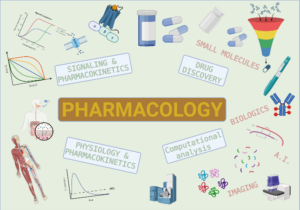Molecular Pharmacology
About

Pharmacology, which is the most translational of the biological sciences, focuses on mechanisms whereby drugs and toxins perturb biological processes. It draws on all basic science fields to investigate how drug targets regulate normal physiological mechanisms and contribute to disease pathophysiology.
Pharmacologists work to identify and validate drug targets with the ultimate goal of intervening — with rational and effective drug therapy — in signaling cascades and metabolic pathways that have gone awry. Such intervention requires understanding of the major organismal control systems and identifying defects in the systems that occur with disease. For example, revolutionary new drug therapies targeting the incretin/GLP system in diabetes are also effective in reducing obesity, a major risk factor for many diseases, and are a recent example of the translation of basic research to the discovery of an effective drug therapy.
The Pharmacological Sciences Training Program at UVA encompasses the breadth of this discipline and provides students with a solid foundation for careers in Pharmacology. The diverse expertise of the Pharmacology faculty provides training opportunities that encompass molecular and cellular biology in the context of whole animal physiology, drug discovery and translational medicine. Technologic advances in AI, imaging, and -omics approaches have accelerated the process of identifying potential drug targets and are expected to improve the success rate of drug discovery and development. Experience and practical training with these cutting-edge tools and an underlying knowledge of organismal physiology can equip students with the skills necessary to contribute effectively to biotechnology and drug discovery research in the future. Students are supported by the Pharmacological Sciences Training Grant, now in its 49th year. Visit our Pharmacology page to learn more.
Faculty
Bayliss, Douglas A.
Mechanisms of neuromodulation in central neurons
Bland, Michelle
Molecular mechanisms linking innate immune and insulin signaling to control cell growth and metabolism
Bourne, Philip E
Data Science
Bushweller, John H.
Drug Development Targeting Transcription Drivers in Cancer; Structure/Function Studies of Transcription Factor Drivers in Cancer
Chalfant, Charles Edward
Hematology and Oncology, Cell Biology, Lipid Signaling, Cancer Cell Signaling, and RNA Biology
Cook, Danielle R.
Immuno-Oncology, T cell therapy, TCR Discovery, Next generation cell therapy
Coutinho-Budd, Jaeda
Neuron-glia and glial-glial interactions
Desai, Bimal N.
Ion channels and Ca2+-signaling in inflammation, immunity and tissue homeostasis
Dolatshahi, Sepideh
Systems Immunology, Cancer Systems Biology, , Neonatal and Maternal Immunology
Egelman, Edward H.
Structure and Function of Macromolecular Complexes Using Electron Microscopy
Engel, Daniel A.
Drug Discovery and Molecular Biology of Pathogenic RNA viruses: Ebola, SARS-CoV-2, Influenza and Zika
Ferris, Heather
Brain metabolism, cognitive decline, insulin signaling and Alzheimer's disease
French, Brent A.
Novel Therapies for Treating and Preventing Ischemic Heart Disease
Harris, Thurl E
Molecular mechanisms controlling insulin signaling and fat synthesis.
Isakson, Brant
Translating our discoveries in the microcirculation to tangible benefits in patients.
Jiang, Lulu
The Pathophysiology of neurodegenerative diseases, including Alzheimer’s disease (AD), Parkinson’s disease (PD) and other dementia-related disorders.
Kapur, Jaideep
Seizures, neuronal excitability and plasticity
Kaya, Alaattin
Metabolic and Genetic Regulation of Aging, Redox Biology, DNA Repair, Comparative and Functional Genomics, Stress Resistance, Drug Discovery, Evolutionary Biology, Synthetic and Systems Biology for Evolutionary Engineering, Adaptive Evolution, Mitochondrial Signaling, Neurodegenerative Diseases
Kelly, Kimberly
Advancement in the design of imaging agents; molecular imaging and radiological sciences.
Kibbe, Melina
Developing novel therapies for patients with vascular disease.
Leitinger, Norbert
Role of lipid oxidation products in inflammation and vascular immunology in atherosclerosis and diabetes
Lynch, Kevin R.
Chemical biology of sphingosine 1-phosphate
Martens, Jeffrey R
Pharmacology
Martin, Timothy D
Identifying tumor selective drug targets, Understanding the genetic drivers of tumor immune evasion
Miller, Clint L.
Genetic variation, Complex diseases, Coronary artery disease, Genomics, Epigenomics, Regulatory mechanisms, Vascular biology, Pharmacology and Physiology
Mohi, Golam
Cell signaling, stem cell biology, molecular and epigenetic mechanisms of blood and breast cancers
Nieh, Edward Horng-An
Understanding the neural code underlying motivated behaviors like feeding, drinking, and social interaction, with a focus on how malfunction in associated brain areas are involved in diseases like addiction and eating disorders
Patel, Manoj
Understanding the cellular mechanisms by which seizures are initiated in SCN8A epileptic encephalopathy (DEE13) and temporal lobe epilepsy. My lab uses a number of experimental techniques including patch clamp electrophysiology and in vivo seizure monitor
Perez-Reyes, Edward
Exploring epilepsy circuits then preventing seizures using gene therapies. Developing drug-inducible genetic switches for insulin replacement gene therapies.
Pompano, Rebecca
Bioanalytical tools for inflammatory disease
Saucerman, Jeffrey J.
Roles of complex signaling networks involved in the regulation of cardiovascular function and disease
Schulman, Ira G.
Regulation of transcription by nuclear hormone receptors, transcriptional control of metabolism and inflammation, small molecule approaches to drug discovery
Sun, Shengyi Iris
Role of endoplasmic reticulum-associated protein degradation in health and disease
Tao, Jianguo
Pathology
Trinh, Bon Q
Understanding Protein and RNA regulations of gene expression via chromatin structure in myeloid cell development and diseases
Tsai, Ming-Feng
Membrane-transport physiology and biophysics
Venton, B. Jill
Analytical Neurochemistry; Dopamine and Serotonin Neurotransmission in Drosophila; Mechanisms of rapid adenosine signaling in rodents
Voss, Kelsey
Iron metabolism and Immunometabolism in inflammation and autoimmune diseases
Wenker, Ian C
Neural control of cardiorespiratory function in health and disease
Yang, Jie
Structural mechanisms of macromolecular complexes, Cryo-EM, Mitochondrial stress, Endoplasmic reticulum stress, Cellular stress response
Zhang, Tian
Integrating high-throughput proteomic, chemical, genetic and computational tools for target identification and drug discovery in cancer biology
Zimring, James C
Alloimmunity in Transfusion and Transplantation , Oxidant Stress Biology in Health and Disease
